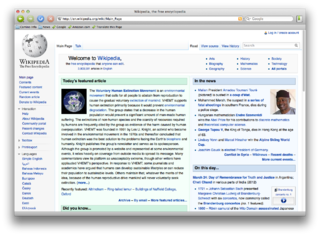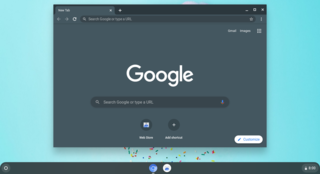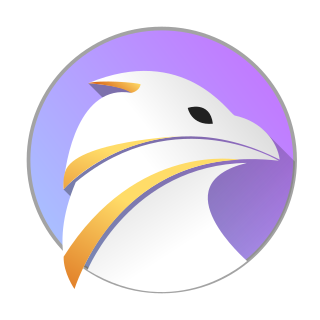
Camino is a discontinued free, open source, GUI-based Web browser based on Mozilla's Gecko layout engine and specifically designed for the OS X operating system. In place of an XUL-based user interface used by most Mozilla-based applications, Camino used Mac-native Cocoa APIs. On May 30, 2013, the Camino Project announced that the browser is no longer being developed.

Mozilla Firefox, or simply Firefox, is a free and open-source web browser developed by the Mozilla Foundation and its subsidiary, the Mozilla Corporation. It uses the Gecko rendering engine to display web pages, which implements current and anticipated web standards. In 2017, Firefox began incorporating new technology under the code name Quantum to promote parallelism and a more intuitive user interface. Firefox is available for Windows 7 and later versions, macOS, and Linux. Its unofficial ports are available for various Unix and Unix-like operating systems, including FreeBSD, OpenBSD, NetBSD, illumos, and Solaris Unix. It is also available for Android and iOS. However, the iOS version uses the WebKit layout engine instead of Gecko due to platform requirements, as with all other iOS web browsers. An optimized version is also available on the Amazon Fire TV, as one of the two main browsers available with Amazon's Silk Browser.
In computing, a user agent is any software, acting on behalf of a user, which "retrieves, renders and facilitates end-user interaction with Web content". A user agent is therefore a special kind of software agent.

Haiku is a free and open-source operating system compatible with the now discontinued BeOS. Its development began in 2001, and the operating system became self-hosting in 2008. The first alpha release was made in September 2009, and the last was November 2012; the first beta was released in September 2018, followed by beta 2 in June 2020 and beta 3 in July 2021.
WebKit is a browser engine developed by Apple and primarily used in its Safari web browser, as well as all iOS web browsers. WebKit is also used by the BlackBerry Browser, PlayStation consoles beginning from the PS3, the Tizen mobile operating systems, and a browser included with the Amazon Kindle e-book reader. WebKit's C++ application programming interface (API) provides a set of classes to display Web content in windows, and implements browser features such as following links when clicked by the user, managing a back-forward list, and managing a history of pages recently visited.

The following tables compare general and technical information for a number of web browsers. For further references, a browser support matrix is a table of support of a Webpage by browsers.
Mozilla Firefox has features that allow it to be distinguished from other web browsers, such as Chrome and Internet Explorer.

NetSurf is an open-source web browser which uses its own layout engine. Its design goal is to be lightweight and portable. NetSurf provides features including tabbed browsing, bookmarks and page thumbnailing.

Google Chrome is a cross-platform web browser developed by Google. It was first released in 2008 for Microsoft Windows, built with free software components from Apple WebKit and Mozilla Firefox. It was later ported to Linux, macOS, iOS, and Android, where it is the default browser. The browser is also the main component of Chrome OS, where it serves as the platform for web applications.

Chromium is a free and open-source web browser project, principally developed and maintained by Google. This codebase provides the vast majority of code for the Google Chrome browser, which is proprietary software and has some additional features.

Uzbl is a discontinued free and open-source minimalist web browser designed for simplicity and adherence to the Unix philosophy. Development began in early 2009 and is still considered in alpha software by the developers. The core component of Uzbl is written in C, but other languages are also used, most notably Python. All parts of the Uzbl project are released as free software under GNU GPL-3.0-only.

Google Chrome Frame was a plug-in designed for Internet Explorer based on the open-source Chromium project, first announced on September 22, 2009. It went stable in September 2010, on the first birthday of the project. It was discontinued on February 25, 2014 and is no longer supported.

Classilla is a Gecko-based Internet suite for PowerPC-based classic Macintosh operating systems, essentially an updated descendant of the defunct Mozilla Application Suite by way of the Mac OS port maintained in the aborted WaMCom project. The name is a portmanteau of Classic, and Mozilla.

Chromium OS is a free and open-source operating system designed for running web applications and browsing the World Wide Web. It is the open-source version of Chrome OS, a Linux distribution made by Google.
The history of Haiku, a free, open-source operating system, began in 2001. As of January 2016, as refactoring FLOSS effort of BeOS named initially "OpenBeOS". It used open sourced code of a Tracker file browser and NewOS kernel. Today, after 4 alpha and 3 beta versions, work on Haiku continues with a fourth beta planned and 'Nightly' builds available between releases.
Haiku Vector Icon Format (HVIF) is a vector storage format designed to store icons, specifically for Haiku.
A lightweight web browser is a web browser that sacrifices some of the features of a mainstream web browser in order to reduce the consumption of system resources, and especially to minimize the memory footprint.

Falkon is a free and open-source web browser. It is built on the Qt WebEngine which is a wrapper for the Chromium browser core.
Blink is a browser engine developed as part of the Chromium project with contributions from Google, Facebook, Microsoft, Opera Software, Adobe, Intel, IBM, Samsung, and others. It was first announced in April 2013.










